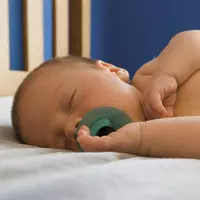Bottles, Pacifiers & Your Baby’s Oral Health
It’s a well-documented fact that babies have a natural tendency to suck. It helps to soothe and comfort them, which is why so many parents allow their small children to suck on baby bottles and pacifiers. However, if not properly monitored, these items can easily create problems for your baby’s oral health. To protect your baby’s teeth and gums, we’re busting 3 myths about bottles, pacifiers and their safe use.
Myth # 1: Pacifiers Are Harmless
In most instances, and only after breastfeeding is established, pacifiers are fine for infants and toddlers. It’s all a matter of choosing the right product and limiting its use. Choose an orthodontic pacifier with rounded tops and flat bottoms that are designed to allow upper and lower teeth to better align.
Pediatricians are divided as to when the best time is to wean a child from a pacifier. Some say around 12 months, when speech begins to develop. Others suggest they can be used into the toddler years, or up to age four.
However, the longer your little one continues to suck, the more likely they are to develop problems with their teeth, specifically a misaligned bite or cavities. Be sure to talk to your pediatrician and your pediatric dentist regarding what’s best for your growing child.
Myth # 2: It’s Okay To Spit Clean Pacifiers
Children drop their pacifiers on the ground all the time only to have a parent spit-clean it and shove it back in their little one’s mouth. But cleaning your baby’s pacifier with your mouth can transfer tooth decay causing bacteria through your saliva. Think twice before spit cleaning your little one’s binky.
Myth # 3: Putting A Baby To Sleep With A Bottle Of Milk Or Formula Is Fine
Many parents think putting babies to sleep at night with a bottle of breast milk or formula may help calm them—but the American Academy of Pediatrics warns against this for several reasons. First, an infant should never be left alone with a bottle. Secondly, both breast milk and formula contain some amount of sugar, which means your child’s teeth will be bathing in it all night long, creating tooth decay.
The natural forming bacteria in your child’s mouth changes the sugar into acids that break down the enamel on their teeth. This can cause a devastating situation called ‘milk bottle carries’ where most or all of the teeth in a child’s mouth rot beyond repair.
Instead, the AAP recommends that if your child needs to suck to soothe while going to sleep, use a pacifier instead of a bottle, as pacifier use is recommended for reducing risks of Sudden Infant Death Syndrome once baby is nursing regularly.
Bottles, Pacifiers & Your Baby’s Oral Health is an article within our Feeding Your Baby section.
RELATED TOPICS:
See How Chef Tyler Florence Makes Baby Food
Parenting Against Picky Eating
Tips on How to Transition Baby to Solids






Comments are closed.